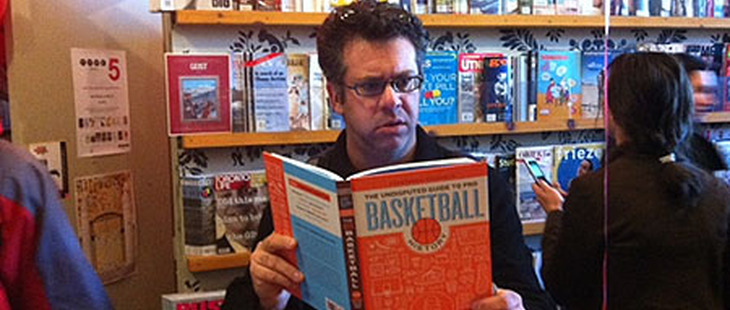
 Playwright and novelist Michael Redhill at Type's fifth anniversary bash. (Becky Toyne)
Playwright and novelist Michael Redhill at Type's fifth anniversary bash. (Becky Toyne)
It is a little known fact, but anyone entering the book business is given a numbered, handwritten list to carry around with them entitled “Signs the Sky is Falling and That Civilization is Ending”. At number two (right under “Prime Minister tells children books are for losers”) is: “The ongoing closure of independent book stores”.
So when Toronto bookstore Flying Dragon closed last week, following institutions like Pages, This Ain’t the Rosedale Library and many others into the deadpool, you can be sure many bibliophiles pulled the list from their pockets and that many wistful sighs were, um, sighed.
An indie bookstore closing is so high up on this totally-real-and-not-at-all-made-up list is that because it’s a sign of the fate of the physical book as it is seemingly supplanted by ebooks, the web, iPads and, so I’m told, pornographic video games. Moreover, the small book shop also plays symbolic double duty, not only standing in for the cultural import of books, but also a kind of anti-corporate mentality that itself has gotten mixed into a nostalgia for tactile, non-digital pleasures.
But in as much as these bookstores closing down is sad, it also seems inevitable, for reasons smartly outlined by Amy Lavender Harris at Open Book Toronto. The indie bookstore always had two advantages: a specialized selection; and its importance in a book community, composed of readers, writers and publishers. For obvious reasons, the web evaporated the first advantage. And though “selling books” seems like a perfectly reasonable thing for a bookstore to focus on, by failing to instead find income in the second, some bookstores doom themselves. All of which leaves Lavender Harris to think the following:
“I have a sneaking suspicion that local, independent bookstores of the future will look like nothing as much as coffee houses cum event spaces offering a few curated shelves of printed books (much like artworks in a gallery) and access to an online portal for the rest of their stock. In the future book enthusiasts may return to bookstores not for the books themselves but for the community they offer and their proprietors’ areas of expertise.”
In fact, the kind of bookstores that are surviving in Toronto are doing something just like that. Take Type Books, whose original Trinity-Bellwoods location just celebrated its fifth anniversary. Type has maintained itself by becoming something like a community hub, hosting readings and other events in its basement space, while excelling at niche markets like art, design and children’s books. It is as if the idea of the bookstore must be redefined if it is to continue to exist.
The outlook for those that don’t change isn’t great, as the economics of brick-and-mortar shops no longer make much sense. In fact, the other purpose of indie bookstores — serving as a liaison between writers, publishers and a reading public — may, as Lavender Harris notes, be better served by things like This is Not a Reading Series instead of actual shops.
But as the small bookstore fades, take a moment to look on the upside. People valorize the indie bookstore because it was a place to find cool, obscure stuff and discover the books you’ve never heard of. But as much as people may hate Amazon and Indigo, the web has made it far easier for readers to get the books they want and prices they can afford. More to the point, the thing that may replace the bookstore — think ‘The Book Bar’, in which patrons drink beer and listen to readings or gather to discuss books — may actually be better at both fostering a reading community and providing a place to discover the books the chains avoid.
By moving a local reading community away from ‘the store’ and toward the group or the collective, you get further and further away from the ‘business of books’ and close to the activity of reading and writing and talking. And if big business screws the innovative or small publisher by putting a chokehold on the distribution chain, the combination of the web and the forthcoming ‘coffee houses cum event spaces’ provides ample way to get the message out and connect with readers. In the demise of the indie bookstore, new ideas and spaces may emerge to fill their literary and cultural function as their economic one is moved online.
Trying to exist outside the logic of capitalism is a bit like running to get out of the rain: you try, but you can’t really stop yourself from getting caught. But it also sure as hell beats simply pulling up your collar, putting your head down and grumbling angrily about what you can’t change. And instead of trying to simply save the indie bookstore, maybe we should spend a lot more time thinking about what could replace it — and how, as a result, we might all be better off.












